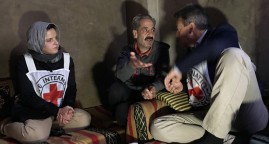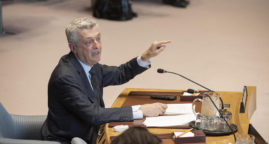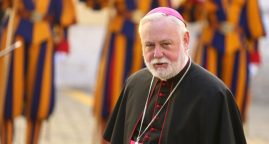Macron pledges pragmatism and cooperation with post-Brexit Britain
Article published on The Guardian website on 06/21/2017 by Angelique Chrisafis
In his first interview since he was elected as French president, Emmanuel Macron sets out his international agenda on Syria, Trump, and European integration
Emmanuel Macron has promised that France will have a strong and pragmatic relationship with a post-Brexit Britain, working together on defence and counter-terrorism because of the two countries’ “linked destinies”.
In his first interview since he was elected as French president last month, Macron told the Guardian and seven other European papers: “Pragmatism will determine our new relationship” with Britain.
Asked if the door really remained open for Britain to go back on Brexit – after his recent remarks, taken as an encouraging sign by opponents of a hard Brexit, that there may be room for compromise – Macron said: “The door is open until the moment you walk through it. It’s not up to me to say it’s closed. But from the moment things are engaged with a timescale and an objective, it’s very hard to go back, we can’t lie to ourselves.”
Macron was firm on the Brexit negotiation process that began this week. He said: “I want the discussions that have just started to be perfectly coordinated at a European level. I do not want bilateral discussions, because the interests of the EU must be preserved in the short, medium and long term.”
He also said migration cooperation at the border in Calais would change as part of a rethinking of refugee and asylum policy.
In a wide-ranging interview as he prepared for his first European council meeting with European leaders in Brussels on Thursday, Macron said:
- France and Germany would lead on closer European integration with more social protection to win back the confidence of doubting lower middle classes across the bloc.
- Central and eastern European and smaller states had to respect democratic values and couldn’t just view Europe “as a supermarket”.
- Chemical weapons use and disrespect of humanitarian corridors in Syria were “red lines” and France was prepared to act alone in response.
- He would engage with Donald Trump and sought the US’s return to the Paris climate accords.
Macron insisted that France would “strengthen” defence cooperation with the British and work more closely than before on joint counter-terrorism, “because our destinies are linked: terrorists groups don’t know European borders”.
But on bilateral migration agreements with Britain, he said: “I want our cooperation to evolve.” Referring to the sprawling migrant shanty camps at Calais that the French government shut down last year, he said: “We absolutely must avoid creating new flashpoint migrant camps.”
Macron’s election – coming after Trump’s election in the US and at a time of European tensions with Vladimir Putin’s Russia and disagreement with central European members – saw him style himself as a centrist, pro-European standard-bearer of democratic values.
He squarely beat the far-right Front National’s Marine Le Pen in the second round run-off, after France’s traditional parties of the left and right – the Socialists and Les Républicains – were knocked out in the first round.
Sitting on the terrace in the Élysée palace garden, flanked by European and French flags, Macron said he wanted to lead a “European renaissance”, by creating a European Union that inspired and took better care of its people. He said he was completely confident in a new era of restored Paris-Berlin cooperation aimed at kickstarting the European project in people’s minds not just in dull meeting rooms. “The key to get going again is a Europe that protects,” he said.
Macron said the biggest challenge and the starting point for his foreign policy was tackling the “crisis that is hitting western democracies”.
He asked: “When you look at the planet today, what do you see? A rise in illiberal democracies, and extremes in Europe, a reappearance of authoritarian regimes that question the vitality of democracy, and the US in part withdrawing from the world. That context is worsened by a rise in uncertainty and troubles – crises are growing in the Middle East and the Gulf, inequalities are growing everywhere in the world.”
He said the crisis came “in part from the profound inequalities created by the world order, and from Islamist terrorism” but he said climate issues were also key. “Anyone who thinks the fight against climate change is mere whim by middle-class liberals is deeply wrong.”
Macron said Europe had no choice but to become the standard-bearer in the fight against illiberalism in the world. “Because democracy was born in Europe. The US likes freedom as much as we do, but it doesn’t have our love for justice. Europe is the only place in the world where individual freedoms, the spirit of democracy and social justice are so closely joined. So the question now is: will Europe succeed in defending the deep values it brought to the world for decades, or will it be wiped out by the rise in illiberal democracies and authoritarian regimes?”
Macron said the key to reconciling European people with the European project was to tighten rules on workers and make it harder for companies to employ cheaper labour from other EU countries or shift production to lower-wage countries, undercutting others.
He said: “We have to promote a Europe that goes towards greater economic and social wellbeing.” For him, allowing undercutting of wages and an influx of low-paid workers on temporary assignments was sapping support for Europe and “turning the European project on its head”. He said: “Let’s not get this wrong. The great defenders of this ultra economically-liberal and unbalanced Europe – the UK – came crashing down on this. What did Brexit play on? On workers from eastern Europe who came to take British jobs. The defenders of the European Union lost because the British lower middle classes said: ‘Stop!’” He said “extremes feed off imbalances like this” and the European Union couldn’t remain shut up in summits and offices and “let things crumble”.
Macron said the solution lay in a renewed “common force” between France and Germany to transform and inject enthusiasm into the European project. “Everywhere in our societies, the lower middle classes have started to doubt,” he said. During his election campaign Macron made overtures to Germany, to end the mistrust and deadlock that had plagued the Franco-German motor, marked by France’s poor economic performance and ongoing struggles with its deficit. Macron had pushed for closer integration of the eurozone with a eurozone budget, joint defence, and an overhaul of refugee and asylum policy. He said: “We have to create a Europe that protects with a real defence policy and common security.” He said asylum, refugee and migration policy must be “profoundly reformed”.
Macron said it was not about more summit wrangling. To “spend whole nights asking about where the next European agency should be or how to spend whichever budget” would be to pass history by, he said. “The question is to know how to restore the dynamic and bring people on board. It’s not just about pressing policy onto countries or people; you have to be able to bring them along with you, make them dream.” He said this couldn’t happen “if France doesn’t doesn’t reinforce its own economy and society”. He acknowledged that Germany had done its economic structural reforms 15 years ago and knew the situation wasn’t viable. He promised: “That’s why I have asked the government to engage the fundamental reforms which are essential for France.” He said: “Our credibility, our efficiency, our strength is on the line.”
He insisted that Germany was totally in agreement and understood the need to stand together. “National egotisms are slow poisons that bring about the weakening of democracies and a collective inability to rise up to our historic challenge,” he said, adding: “I know the German chancellor, Angela Merkel, is conscious of that.”
After an election campaign in which he had strong words for central European states such as Poland and Hungary for not cooperating on refugees and respecting European values, Macron now insisted he did not believe in “a conflict between east and west in Europe”. But he nonetheless warned against certain European leaders “abandoning principles, turning their backs on Europe, having a cynical approach to the European Union that only served as dispensing credit without respecting its values”.
He stated: “Europe isn’t a supermarket. Europe is a common destiny. It is weakened when it accepts its principles being rejected. The countries in Europe that don’t respect the rules should have to face the political consequences. And that’s not just an east-west debate.” He added: “I will speak to everyone with respect but I won’t compromise on European principles – on solidarity or democratic values. If Europe were to accept that, it would mean it’s weak and had already ceased to exist.”
After meeting Trump last month with a deliberately firm handshake before Trump decided to pull the US out of the Paris climate accords, Macron said: “Donald Trump is first and foremost a leader elected by the American people. The difficulty today is that he hasn’t yet drawn up the conceptual framework of his foreign policy. So his politics can therefore be unpredictable, which is a source of discomfort for the world. In terms of the fight against terrorism, he has the same drive for efficiency that I do. I don’t share some of his choices, above all on the climate issue. But I hope we can find a way for the US to return to the Paris climate accords. That’s the hand I extend to Donald Trump. I hope he changes his view. Because everything is connected. You can’t want to fight efficiently agains terrorism and not be engaged for the climate.”
On Syria, Macron had said after he met Putin last month that his red-line was the use of chemical weapons and that France was ready to take immediate action if they were used. Asked if that meant France could strike on its own, Macron said: “Yes. When you fix red-lines, if you don’t know how to make sure they are respected, you’re choosing to be weak. That’s not my choice.” He added: “If chemical weapons are used on the ground and we know how to find out their provencance, France will launch strikes to destroy the chemical weapons stocks.”
He warned of the lessons of 2013, when Barack Obama had set a red line over chemical weapons but didn’t intervene, suggesting that had sent a message to leaders such as Putin that they could have a free hand in other areas like Ukraine. “The US fixed a red line but made the choice not to intervene. What weakened France [then]? Politically defining a red line but not taking the consequences. And what therefore freed up Vladimir Putin in other theatres of operations? The fact that he saw that he had people facing him who had red lines but didn’t enforce them.”
On Putin, whom Macron hosted last month at Versailles, he said: “I respect Vladimir Putin. I had an constructive exchange with him. We have real disagreements, on Ukraine in particular, but he has seen my position. I talked to him at length face to face about international issues as wells as defending NGOs and liberties in his country.”
Macron said that on Syria: “My profound conviction is that we need a political and diplomatic roadmap. We won’t solve the question only with military force. That is a collective error we have made. The real change I’ve made on this question, is that I haven’t said the deposing of Bashar al-Assad is a prerequisite for everything. Because no one has introduced me to his legitimate successor! My line is clear: one, a total fight against terrorist groups. They are our enemies …. We need the cooperation of everyone to eradicate them, particularly Russia. Two: stability in Syria, because I don’t want a failed state. With me, there will be an end to the kind neoconservatism imported into France over the last 10 years.
“Democracy isn’t built from the outside without the people. France didn’t take part in the Iraq war and that was right. And France was wrong to go to war in Libya in this way. What was the result of those interventions? Failed states where terrorist groups prospered. I don’t want that in Syria. Three: I have red lines on chemical weapons and humanitarian corridors. I said it very clearly to Vladimir Putin. I will be uncompromising on that. So the use of chemical weapons will be met with a response, and even if France acts alone.”
He added: “France will be perfectly aligned with the US in that respect.”
On Syria, he said his final demand was “stability in Syria in the medium term. That means respect for minorities. We have to find the ways and means for a diplomatic initiative that respects all those principles.”
Macron, 39, a former banker and economy minister in François Hollande’s Socialist government, had never run for office before the presidential election, and his political movement La République En Marche! – which he has described as “neither left nor right” – was only founded just over a year ago.
Asked if his election had held back populism in Europe, Macron said he was “not so arrogant” to think his election marked a complete stop to demagoguery. He said “France is not a country that you reform, it’s a country that you transform, a country of revolution. So as long as it’s possible not to reform, France doesn’t do it. This time, people saw they were at the edge of a precipice and they reacted.”
He said of his absolute majority in parliament elections this week, that cemented the collapse of the decades-old traditional French parties, as well as being seen abroad as holding back populism: “My election, and my majority in parliament are not the end of something: they are a challenging beginning. It’s the start of a French renaissance, and I hope a European one.” He said he wanted to bring back ambition and “not play on fears but transform them into energy”.
He added: “Fears are still there and what divides societies is still there. There are no magic solutions, it’s a combat for every day.” He said the issue was to appeal to the intelligence of citizens. “What exhausts democracies is politicians who think their fellow citizens are stupid …. The crisis of western imagination is a huge challenge and it’s not one person alone who will change it. But I want to get back the line of history and energy of the European people, to hold back the rise of extremes and demagoguery. Because that’s a battle of civilisation.”
Related Articles
Syria: “Time to end this horrendous war”
02/26/2016. “These violations lead to unimaginable and unnecessary suffering” (Peter Maurer)
UN’s Grandi slams ‘toxic language of politics’ aimed at refugees, migrants
04/09/2019. Mr. Grandi said that the stigmatization of refugees and migrants is “unprecedented,” and that traditional responses to refugee crises appear increasingly inadequate.
AB Gallagher on Holy See’s action to protect Christians and other minorities
05/22/2017. The Holy See’s ‘foreign minister’, Archbishop Paul Gallagher full statement






